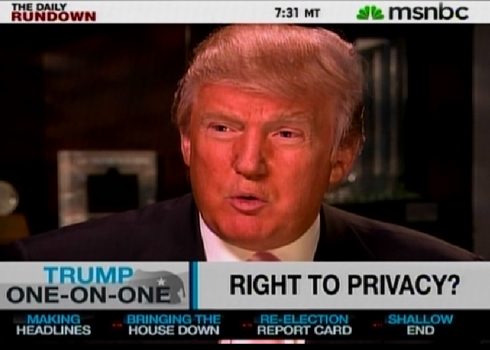Donald Trump is 100% pro-life. Except when it comes to the basis of Roe v. Wade which made abortion legal in the United States. That he agrees with, 100%.
In an interview with MSNBC’s Savannah Guthrie, Trump was asked if he believes there’s a right to privacy in the Constitution.
The question is an important one in the abortion debate. Pro-lifers say there absolutely is not a Constitutional right to privacy, which means Roe is a travesty and abortion should once again be permitted to be outlawed in the states that choose to do so. Pro-choicers strenuously disagree, stating that the right to privacy is guaranteed and is extended to a woman’s choice to have an abortion or not, the central basis of Roe.
Trump apparently thinks he can split the difference, and appeared to have no understanding of the connection between the view of a right to privacy and the abortion debate.
“I guess there is, I guess there is,” Trump said when Guthrie asked if there’s a Constitutional right to privacy. “And why, just out of curiosity, why do you ask that question?”
Guthrie informed him of the connection to abortion, but Trump seemed surprised that the two went together:
“Well, that’s a pretty strange way of getting to pro-life. I mean, it’s a very unique way of asking about pro-life. What does that have to do with privacy? How are you equating pro-life with privacy?”
Watch:
Visit msnbc.com for breaking news, world news, and news about the economy
The pro-life establishment was not impressed. Over at LifeNews, a website devoted to the anti-abortion cause, blogger Steven Ertelt slammed Trump for his position on a right to privacy, and wrote that it might put Trump’s “pro-life conversion” in doubt:
Grassroots pro-life voters typically welcome converts to the pro-life cause but, in the political world, view recent converts with skepticism because they appear to have made the conversion solely because they desire pro-life votes in an upcoming election. Trump’s response to the question makes it appear he needs to study up on the abortion debate if he wants his pro-life conversion to be taken seriously as the creation of the fictitious right to privacy is the hallmark of the Roe decision and one of the chief objections pro-life advocates have to it.
If Trump wants the respect of the pro-life community — and by extension, the GOP — Ertelt wrote, he needs to “assure conservative voters he will appoint only strict constructionists who respect the rule of law and won’t legislate from the bench.”
The National Review‘s Katrina Trinko shared Ertelt’s concerns after the privacy comment. “it becomes clear that Trump’s political conversion may be more recent — and less complete — than commonly assumed,” she wrote.
As LifeNews pointed out, Trump was pro-choice as recently as 2000, when he wrote his political manifesto The America We Deserve during his flirtation with running for the Reform Party presidential nomination. In the book, Trump wrote that he was pro-choice but supported a ban on late-term abortions.
Here’s a clip of what that position sounded like, from a 1999 Trump appearance on Meet The Press pulled by Chris Matthews Tuesday:
A couple weeks ago, Trump explained his shift in an interview with the Christian Broadcasting Network. Trump said that he became pro-life after a friend’s wife had a baby the friend didn’t originally want her to have. The baby eventually became “the apple of [the friend’s] eye” and the man now views his child as “the greatest thing that’s ever happened to him.”
“And you know here’s a baby that wasn’t going to be let into life,” Trump told CBN. “And I heard this, and some other stories, and I am pro-life.”
Watch:
It should be noted that at least one other would-be Republican presidential candidate has failed the right to privacy test and remained a paragon of the pro-life movement. Back in 2008, Katie Couric asked Sarah Palin if she thought there was a Constitutional right to privacy.
“I do,” Palin said. “I do.”







Pro-Lifers demand death: